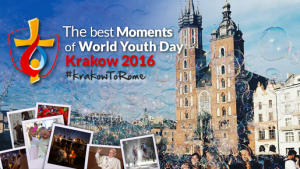I woke up at 4 a.m., partly from lingering jet lag but mostly from jittery anticipation. Here I was, staying in the stunning and historic Main Square of Kraków, Poland for a week-long reporting gig to cover World Youth Day festivities. I shuffled into the dusty kitchen to make a pot of coffee, the rest of the media team sleeping soundly after another exhausting but exhilarating day. As I stared out the window in a pre-caffeine daze, the birds chirped away on the neighboring rooftops. The fresh air and serene scene drew me in. This is where I wanted to write. I dragged a chair over and propped my laptop and coffee mug on the window sill. My fingers flew across the keyboard. In this foreign land, my creative energy was flowing.
Travel is an investment in your imagination.
It expands your mind through new experiences, environments, and interactions. This Polish pilgrimage shoved me out of my comfort zone creatively, personally, and spiritually. Every time I take an extended vacation, move to a new city, explore an unfamiliar neighborhood, or go on a spontaneous day trip, my head clears up and my imagination is sparked. “Creative individuals recognize that travel not only allows for incubation, but also can create new connections and ways of thinking that enhance effectiveness,” Renee Kosiarek, author of The New Leader: Harnessing The Power of Creativity to Produce Change explains. Travel loosens the grasp of the familiar to accept inspiration from the new. Here’s how.
It immerses you in diversity
Adapting to the unknown reveals unexpected connections.
New cultures shatter your preconceived notions, making you more receptive to different approaches and possibilities. Social psychologist Adam Galinsky’s study uncovered that learning experiences during travel help you realize underlying connections and relationships to solve creative problems. This doesn’t mean that lounging at an all-inclusive resort will cause a groundbreaking revelation. You need immerse yourself in the local culture and engage in learning activities. Galinsky’s research found that creative enhancement happened only when the participants had actively learned while traveling or actually lived in a new place.
It increases your mental flexibility
The scope of your creativity relies on your brain’s neuroplasticity.
Neuroplasticity is your brain’s ability to adapt to new situations and environment changes. When you have unfamiliar experiences, your neurons are forced to respond by forming new connections. These connections boost your mind’s flexibility, making ideation easier. Travel triggers this neural process. “Foreign experiences increase both cognitive flexibility and depth and integrativeness of thought, the ability to make deep connections between disparate forms,” Galinsky shares. A flexible mind is a creative mind.
It lets your ideas incubate
Distance and distraction spark subconscious rumination.
Traveling helps launch the incubation phase of creativity. Incubation is when your brain unconsciously mulls over a creative challenge and surprises you with an insight. As you adventure, your brain continues to work in the background. Elusive solutions can pop up suddenly and unexpectedly. Galinsky’s study supports the theory that distraction isn’t detrimental to creativity. Shelley H. Carson, Harvard University researcher, psychologist, and author of Your CreativeBrain,’expands, “A distraction may provide the break you need to disengage from a fixation on the ineffective solution.” It leads you into incubation so your ideas can marinate while your mind wanders freely.
It jolts you out of introspection
Travel directs your attention outward.
Introspection lets you pull from your knowledge and intuition to make something original. A critical part of the creative process, it’s good until it becomes excessive. Sometimes, you get paralyzed by your own thoughts and need to take a step back—or away. Travel requires you to observe and interact with the external. You may think that shifting your attention outward inhibits the creative process, but mental breaks actually clarify your creative convictions. As psychology professor at the University of South Carolina Mary Helen Immordino-Yang confirms, “Our ability to differentiate our own beliefs and values is tied up in the richness of the cultural experiences we have had.”
It gives you a fresh perspective
You return home with a new outlook on the world and your work.
Besides generating brand new ideas, travel also refreshes your approach to tasks that might have stumped you at home. Inspiration often strikes while you’re traveling, but it can also hit you after you return. These travel-inspired perspectives confront your views about life and work. You uncover unexpected angles and abstract answers. As British poet T.S. Eliot reflects in his book Four Quartets: “We shall not cease from exploration, and the end of all our exploring will be to arrive where we started and know the place for the first time.” Travel pushes you to unlearn and unwind, expanding your intellect.
It stimulates all your senses
Novel places and people heighten your perception.
New sights, sounds, tastes, and smells mobilize your neural pathways: connected nerves that transmit information in your brain. The activation of neural pathways increases your potential for idea generation. Gregory Berns, chair of neuroeconomics at Emory University and author of Iconoclast: A Neuroscientist Reveals How to Think Differently, elaborates on the link between sensory stimulation and inspiration: “When I started thinking about what are the elements of innovation, and in the extreme, iconoclasm, the first thing that I realized was that in order to do something different, you have to see things differently at very much a literal level.” Applying your senses in new ways reconfigures your neural networks to provoke your creativity.
It breaks down creative conservatism
Being open-minded lets you explore many solutions.
Living and working in the same environment stifles your imagination over time. Static settings can leave you stuck, unable to think clearly and creatively. Shifting your location helps your brain escape creative block. According to a study published in the Journal of Experimental Social Psychology, the further you remove yourself from your typical habitat and lifestyle, the more open-minded you become. A receptive mind lets you consider alternatives to solve problems creatively.
It deepens your spirituality
Mindfulness prompts creative and spiritual growth.
When you practice meditation or prayerful reflection, you get the creative impact of travel and mindfulness. In fact,30-minute daily meditations improve creative performance and emotional stability. Similarly, another study proved the correlation between creativity and mindfulness. To achieve the most spiritual progress possible, go on a pilgrimage: a journey to a destination with spiritual significance. Mindfulness is a byproduct of prayer, so the reflective focus of a pilgrimage can strengthen your faith — and your imagination.
Travel helps you revisit creative challenges with greater focus and clarity. Be intentional about how you spend your time traveling. Apply your creativity, distract your mind, and practice mindful reflection. The fluid ideation I experienced in Poland was the result of writing, relaxing, learning, interacting, and praying. I was fully immersed in the culture and my craft. Interviewing and observing the pilgrims and locals, I was exposed to diverse stories, traditions, and nationalities. I came home with a positive spirit and a refreshed mind. Every adventure offers new creative blessings. Where will you travel next?

Read more:
The Best Moments of World Youth Day, Krakow 2016

